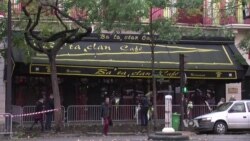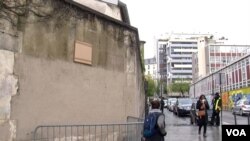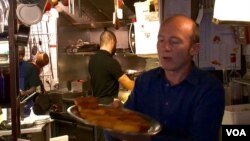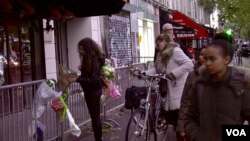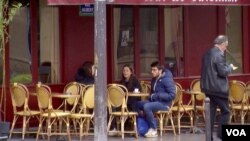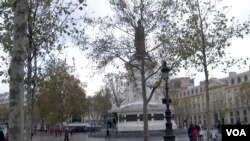The plaque for the victims is secured on the concrete wall across from the Bistrot des Oies, waiting to be unveiled Sunday. But already restaurant owner Stephane Dantier doesn't like it.
"It transforms this neighborhood into a monument to the dead," Dantier says. "We didn't want it."
Nearby, diners linger over a late lunch. Dantier himself is having a glass of red wine with customers at the bar.
Across the street one year ago, jihadist gunmen opened fire on a balmy November evening, killing 15 people at a bar and Cambodian restaurant. Today, both establishments are back in business, but the neighborhood is not the same.
"We can't move on," Dantier says of the November 13 attacks last year that killed 130 people and wounded more than 400.
Old wounds linger
As France commemorates the anniversary of its deadliest terror attack in recent history, old wounds are reopening even as more tangible traces remain of the string of shootings and bombings across the capital.
Nearly two dozen victims are still hospitalized; hundreds are getting psychological counseling. Rights groups warn of eroding civil liberties under the ongoing state of emergency and of a Muslim community increasingly stigmatized.
Few believe it is the end
The November attacks were the second major strike in Paris last year, and there have been others in France since, including July's truck rampage in Nice. With authorities saying they are foiling terror plots daily, many are on edge.
"Terrorism is terrible because it affects people's confidence," says Dominique Szepielak, a psychologist with the French Association of Terrorism Victims. He believes the attacks have inflicted a national trauma.
"Before you're able to go out in the street, enjoy the sun, go to a cafe. Now you have people who are careful about everything," he says.
On the surface, the city has returned to normal. On Saturday night, a sellout Sting concert reopens the Bataclan, where 90 people died in a hail of gunfire and bombings. Other Paris cafes and bars targeted by the terrorists are also back in business, blasted windows replaced and fresh coats of paint covering bullet-pocked walls.
"The past is always with us, but we all need to get on with life," says Audrey Bily, manager of Cafe Bonne Biere, where gunmen shot to death five people.
Painful memories
Bataclan survivor Emmanuel Domenach also thought he was on the road to recovery. But the year anniversary of the attacks has brought back painful memories.
"Just when you have the impression things are getting better, you're back at the psychologist because the wounds are still there," says Domenach, vice president of a survivor's group called November 13, Brotherhood and Truth. "It feels like a kind of defeat."
He is also alarmed at what he sees as the broader fallout of last year's attack: rising intolerance on the streets, and a law-and-order response to terrorism "that doesn't deal with fact that our society produces terrorists."
"As an association we're fighting for solidarity and fraternity," Domenach adds, "and today we have the impression these values are being swept aside, and replaced by hate."
He is not the only one worried.
A new report by the International Federation for Human Rights slams France's state of emergency for rolling back civil liberties, and cites police searches and other measures that unfairly single out the country's Muslim community.
'Alarming landscape'
FIDH lawyer Clemence Bectarte points to other measures adopted into law a few months ago that strengthen the hand of police and prosecutors and weaken that of the courts.
"It's an alarming landscape," Bectarte says. "These measures were inconceivable a few years ago."
Many hope to set aside those divisions Sunday, as commemorations for the November 13 victims take place around the capital. A minute of silence was observed during the France-Sweden soccer match at the Stade de France stadium outside Paris, where suicide attacks last year left three people dead.
At the Bistrot des Oies, owner Dantier says he will join others in the neighborhood in placing lanterns for the victims at the nearby Canal Saint Martin. The attacks have solidified bonds in an already close-knit neighborhood, he says, but that is not enough.
"With the Nice attacks, it's all come back," Dantier says. "We're all making a big effort, but we feel wounded."




